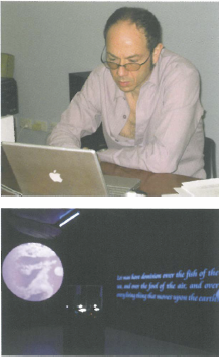
'Let man have dominion over the sea and sky and every living thing'
Genesis
The Eduardo Kac workshops were part of the EAF's Art of the Biotech Era program. Kac presented a series of lectures and discussions based on the ideologies of consciousness and ethics. Is the exploitation of living material any less valid because it occurs under the banner of art?
Scientific theory can be perceived to be directly analogous to social experience. Bodies are subjugated according to hierarchical categories. Colonialism, the power or ownership of an area or people by another, may be cognate to bio-colonialism. Humans protect, own, or kill living organisms according to notions of life-administering power. Do we have equal respect for life, whether human, dog, spider, plant or bacteria?
According to Cartesian philosophy humans are distinct from other living organisms because they possess a soul/mind which is separate from the physical body. New developments in biotechnology result in the dissolution of boundaries between species. Since the mapping of the gene code it has become evident that humans are genetically related to other living organisms, and particularly closely related to chimpanzees and pigs. At some stage, humans have also acquired the gene sequences of viruses. Kac surmised that this defines us as transgenic. Therefore gene splicing across species is not a new phenomenon. If we take Richard Dawkins' view that all aspects of life are governed by the genes, including behaviour and awareness, could it be that other living organisms possess consciousness?
Thomas Nagel's text, What's it like to be a bat? was examined to affirm that consciousness is problematic and relegated to the subjective experience - we cannot be sure what it's like to be anything but ourselves. The concept of a collective consciousness, a communication at the molecular level of all living things was considered possible. Consciousness gives rise to ethical dilemmas for those who would use living organisms for scientific, economic, nourishment or artistic purposes.
Kac began with a historical overview of artists and artworks which drew on living organisms as subject or medium. These included plant breeding by Steichen, the fungal drawings of David Kremers and the anti-modernist 'messy' performance Oh Sensibility by the Viennese Actionists. These works encompass life, death, the ephemeral and growth. The second lecture followed the theme of Art and Ecology as a holistic view of life and an alternative to scientific reductionism and the machine aesthetic. It is interesting that Kac suggests that contemporary artists who investigate living bodies through the techniques of biotechnology engage in the rematerialisation of art, a return to the body.
Although otherwise comprehensive, notably absent from the lecture regarding contemporary works were fuzzy biological saboteurs the Critical Art Ensemble, do-it-yourself artist Heath Bunting and genetic artist Joe Davis. According to Kac, he prefers work which is poetic and subtle in its politics. The Critical Art Ensemble disapproves of 'art which is apolitical (or hiding its politics)'.
Kac appears to be a proponent of genetic modification given that he delegates transgenic and other manipulated organisms to the exotic rather than the monstrous. George Gessert, who breeds flowers counter to accepted breeding guidelines, was described as 'doing the work of a bee'. Cats are selectively bred towards mutation in David Powell's Cattery.
Living organisms are ephemeral and artists must decide on the lifespan of the work. Is the work temporal or does it require ongoing care? Difficulties are faced by artists using living materials in negotiating, suitable spaces for exhibiting, lab residencies, quarantines and shipping. This has become more difficult in the post 9/11 biohazard paranoia. However artists as amateurs have certain freedoms; they do not need to conform to accepted standards and may appropriate tools for uses other than intended. Kac states that 'life is a plastic medium to be molded... (however) awareness disturbs comfortable patterns of knowledge'.












